Máy đóng viên nang được thiết kế để đóng chính xác các viên nang rỗng với liều lượng đã được đo lường sẵn như bột, hạt, viên nén hoặc chế phẩm dạng lỏng. Đối với sản xuất dược phẩm hoặc thực phẩm chức năng quy mô lớn, hoạt động ổn định và không bị gián đoạn của máy là tối quan trọng để đáp ứng nhu cầu sản lượng và đảm bảo chất lượng sản phẩm.
Việc đạt được sự ổn định thiết yếu này phụ thuộc vào các tính năng kỹ thuật mạnh mẽ. Một máy đóng viên nang tự động tiên tiến kết hợp các thành phần quan trọng như Cam tích hợp được thiết kế đặc biệt và ổ trục không dầu. Những yếu tố này đóng vai trò thiết yếu trong việc giảm thiểu rung động, giảm mài mòn và đảm bảo chuyển động mượt mà, đáng tin cậy trong suốt quá trình vận hành tốc độ cao kéo dài. Độ ổn định cơ học vốn có này rất quan trọng để duy trì độ chính xác cao trong quá trình chiết rót, cần thiết để định lượng chính xác từng viên nang được sản xuất.
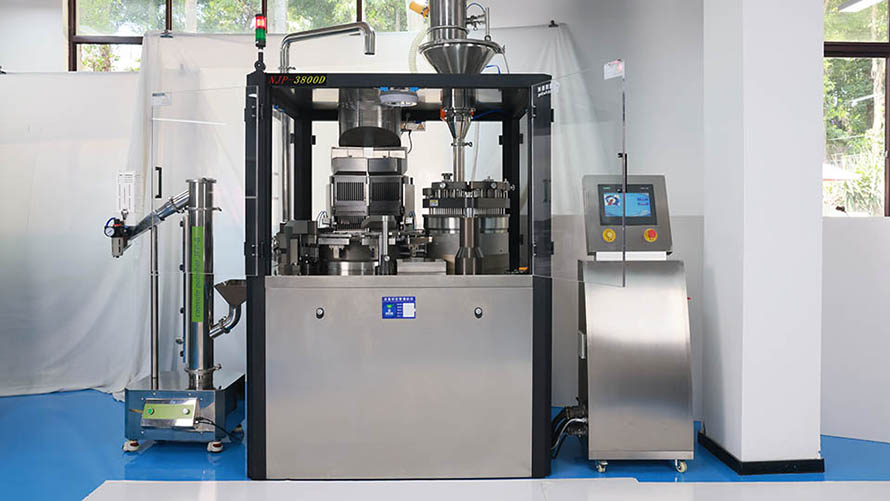
máy đóng viên nang hoàn toàn tự động
MỘT đạt được hoạt động ổn định, lâu dài đòi hỏi phải nắm vững các thực hành vận hành cụ thể và bí mật bảo trì , w trong khi lựa chọn Một Phải chất độn viên nang dựa trên các yếu tố quan trọng là bước đầu tiên thiết yếu .
● Độ ổn định hoạt động : Độ chính xác là tối quan trọng , trong khi sự ổn định hoạt động của máy là trụ cột duy trì độ chính xác. Tìm kiếm một chất độn viên nang máy kết hợp các cơ chế tiên tiến như đầu chia quang học để lập chỉ mục cái đó tăng cường tính nhất quán của liều lượng và giảm thiểu viên nang sự thay đổi về trọng lượng. Điều quan trọng là phải xác minh các yêu cầu bồi thường của một nhà cung cấp thiết bị dược phẩm thông qua bằng chứng được ghi chép chứng minh rằng chất độn viên nang luôn đạt được sai số làm đầy ≤3% trên toàn bộ phạm vi hoạt động của nó .
● Tốc độ & Đầu ra : Dược phẩm p nhu cầu sản xuất quyết định tốc độ yêu cầu. M các máy móc rất đa dạng, từ Một bán nhỏ hơn tự động máy đóng viên nang ĐẾN Một công nghiệp năng suất cao máy đóng viên nang tự động . Một giờ tốc độ cao máy đóng viên nang tự động là có khả năng xuất ra ting qua 500.000 viên nang mỗi giờ. Hãy đánh giá cẩn thận khối lượng hiện tại và dự kiến của bạn để lựa chọn viên thuốc viên nang máy làm hiệu quả đó đáp ứng mục tiêu thông lượng của bạn mà không bị quá tải hoặc tắc nghẽn.
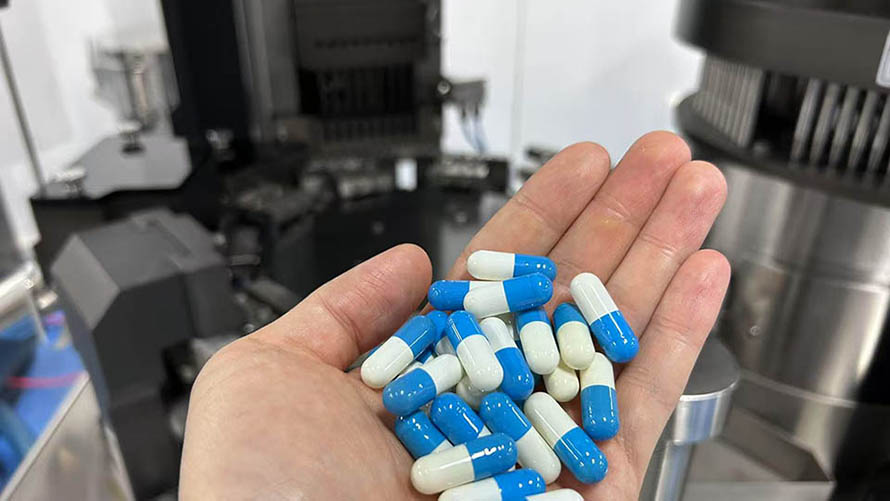
● Tính linh hoạt : Tính linh hoạt là chìa khóa cho đóng viên nang hoạt động. Hãy xem xét khả năng của một máy viên nang để xử lý nhiều loại bột khác nhau , bao gồm gắn kết, trôi chảy, Và hỗn hợp thảo dược , và có khả năng các công thức khác như viên nén hoặc hạt s. Tương đương có ý nghĩa là khả năng tương thích với nhiều kích thước của viên nang từ kích cỡ 00 đến kích cỡ 4. Máy đóng viên nang hoàn toàn tự động đa năng mang lại những lợi thế đáng kể cho việc mở rộng và thích ứng dòng sản phẩm sự phân chia ĐẾN tiến bộ nhu cầu thị trường.
● Tuân thủ quy định : Tuân thủ nghiêm ngặt thuốc tiêu chuẩn chất lượng và an toàn là không thể thương lượng trong dược phẩm ngành . Đảm bảo tự động nạp viên nang máy móc được xây dựng để đáp ứng cGMP, các tiêu chuẩn ISO có liên quan (ví dụ: ISO 13485 cho y tế thiết bị ) và các quy định của FDA/EU. Thành phần liên lạc thành phần dược phẩm phải tuân thủ (ví dụ: USP Lớp VI) và mạnh mẽ tài liệu , bao gồm DQ/IQ/OQ/PQ , phải có sẵn.
● Dễ sử dụng và tích hợp: Tham khảo sự thân thiện với người dùng và tích hợp liền mạch vào một dây chuyền sản xuất . Đánh giá sự phức tạp của việc chuyển đổi giữa kích thước viên nang và công thức , vì nhanh chóng và công cụ - ít hơn khuôn thay đổi tăng cường S hiệu quả , chỉ tiêu tốn 11% thời gian thay đổi khuôn mẫu của thiết bị thông thường . Hơn nữa, hãy đánh giá nhu cầu tiện ích của máy (điện, không khí , Nước ), và khả năng tương thích với thượng nguồn hiện có hoặc thiết bị hạ lưu chẳng hạn như viên nang nâng cao máy xúc lật , máy khử bụi, Và máy dò kim loại, để đảm bảo tích hợp trơn tru vào sản xuất dược phẩm đường kẻ.
Ngoài tất cả những cân nhắc này, việc chạy ổn định đặt nền tảng cho máy móc thượng đẳng hiệu suất.
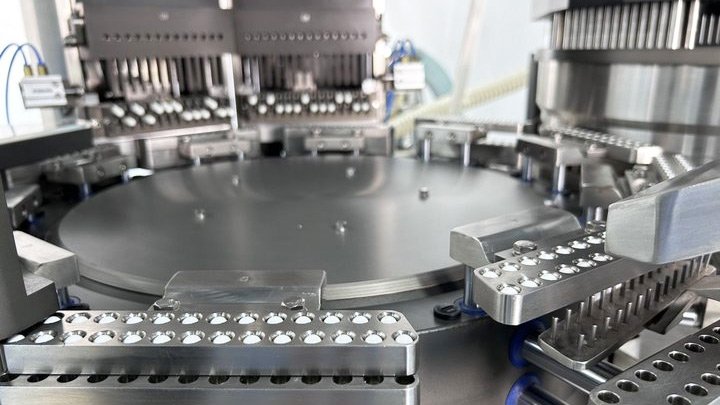
máy đóng viên nang tự động hoàn thành việc phân phối viên nang rỗng, mở viên nang, định lượng thành phần, khóa viên nang và xuất viên nang thành phẩm một cách tự động
Đối với sản xuất viên nang dược phẩm quy mô lớn, viên nang Sự ổn định của máy móc là trụ cột cơ bản cho phép đạt hiệu suất vượt trội ở tốc độ vận hành cao. Nó quyết định trực tiếp đến sự đồng bộ chính xác của tất cả xử lý và đảm bảo độ chính xác liều lượng tuyệt đối trong từng viên nang. Khi lựa chọn thiết bị, hãy ưu tiên các yếu tố liên quan đến độ ổn định sau:
● Hệ thống cam được tối ưu hóa độ cứng : P tham khảo nội bộ cam trên bên ngoài một S .
● Độ chính xác lập chỉ mục dưới micron : Một sự đổi mới viên thuốc máy làm viên nang sử dụng Bộ chia quang học ≤3 giây cung .
● Các thành phần chuyển động giảm chấn : Vòng bi không dầu PTFE trong một bàn xoay là khuyến khích .
● Vòng bi không dầu PTFE để máy chạy ổn định hơn.
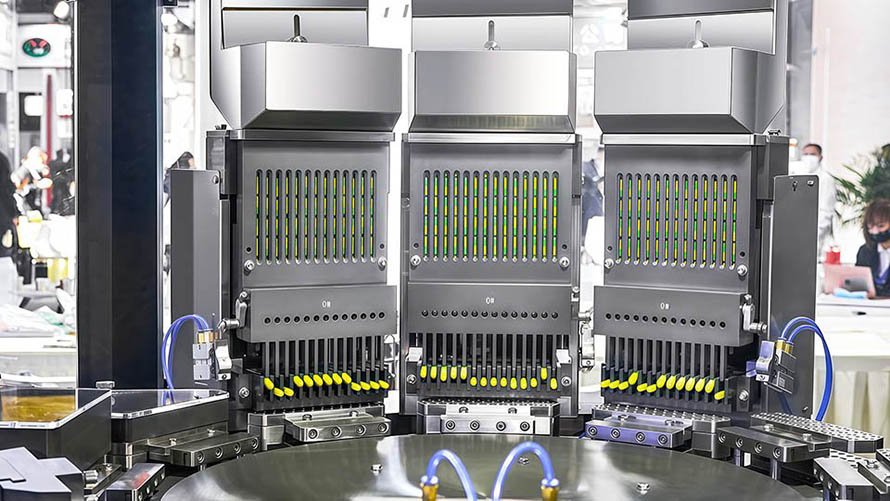
cơ chế phân phối viên nang của máy đóng viên nang
Việc bỏ qua những yếu tố này có nguy cơ thay đổi liều lượng ±5% và qua 30% hoạt động thời gian chết . S tính ổn định là không một lựa chọn, nhưng một c Sự cần thiết bắt buộc của GMP.
Các nhà sản xuất nổi tiếng với việc giới thiệu máy móc cải tiến đương nhiên nhận được sự tin tưởng lớn hơn. Rich Packing là trụ cột của độ tin cậy trong cái này ngành, cùng với đứng đầu dược phẩm thiết bị nhà cung cấp như Syntegon và Fette. Ví dụ, Rich Đóng gói ' s tự động viên thuốc viên nang học viên các mô hình được thành lập e Hộp lập chỉ mục 180DS và Đầu phân chia quang học Zeiss do Đức thiết kế dành cho nhất quán độ chính xác N , sử dụng ổ trục không dầu bên dưới trục chính bảng dữ liệu để tăng cường sự ổn định và tính năng e ổ trục cam tích hợp để vận hành nhà máy điện cho hiệu suất hoạt động trơn tru.
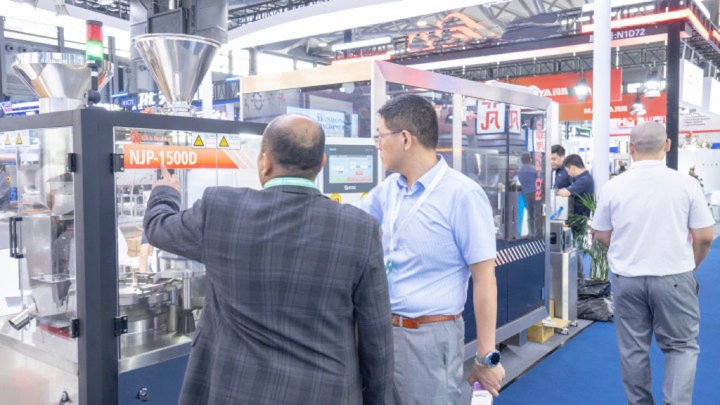
Rich Packing giới thiệu máy đóng viên nang tự động NJP 1500D tại CPhI Expo 2025
TÔI cam bên trong S chứng minh những lợi thế đáng kể so với bên ngoài đối tác s về độ ổn định vận hành, duy trì độ chính xác và độ tin cậy lâu dài. Ưu thế về hiệu suất này về cơ bản bắt nguồn từ các nguyên lý về động lực học cơ học, độ cứng kết cấu và đặc tính điều khiển chuyển động.
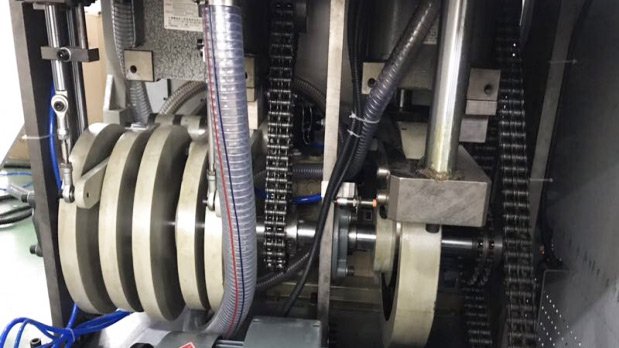
cam bên trong máy đóng viên nang
|
So sánh |
Cam bên trong |
Cam ngoài |
Kết quả |
|
1. Độ cứng kết cấu |
Đường ray cam được đúc liền với trục chính hoặc lồng chặt vào nhau, tạo thành cấu trúc liền khối cứng cáp và có khả năng chống biến dạng vượt trội. |
Đường ray cam được bắt vít vào giá đỡ bên ngoài. Trong quá trình vận hành tốc độ cao, lực ly tâm và rung động gây ra dao động đường ray (biên độ 0,05–0,1 mm) và gây ra độ lệch trạm. |
Cam bên trong duy trì sự đồng bộ của trạm xử lý trong biên độ rung ±5μm, trong khi cam bên ngoài tạo ra dao động đường ray 0,05–0,1mm gây ra lỗi vị trí trên các trạm nạp, khóa và đẩy. |
|
2. Độ chính xác đường chuyển động |
Các thanh truyền trượt tuyến tính bên trong trục chính, loại bỏ hiệu ứng đòn bẩy. Các biên dạng cam được mài chính xác, đảm bảo đường truyền lực ngắn và trực tiếp. |
Với các thanh kéo dài đến các rãnh bên ngoài, bất kỳ độ lệch phẳng nào ở rãnh hoặc trục không thẳng hàng đều được khuếch đại thành chuyển động cong ở đầu thanh. |
Thiết kế bên trong duy trì độ thay đổi độ sâu lấp đầy của viên nang ≤3%, trong khi thiết kế bên ngoài có thể gây ra độ lệch lấp đầy ≥8%. |
|
3. Độ ổn định nhiệt |
Nhiệt ma sát tỏa ra qua lớp dẫn kim loại của trục, tạo ra sự chuyển đổi nhiệt độ dần dần với biến dạng nhiệt được kiểm soát. |
Sự tập trung nhiệt ma sát cục bộ trên các rãnh bên ngoài gây ra sự tản nhiệt không đều, gây ra sự giãn nở nhiệt khác biệt làm tăng khe hở cặp động học. |
Sau 8 giờ hoạt động liên tục, độ trôi vị trí đục lỗ là <10μm trong thiết kế bên trong, đạt 50μm trong cấu hình bên ngoài. |
|
4. Bôi trơn & Tuổi thọ |
Hệ thống kín áp dụng phương pháp bôi trơn bằng bồn dầu kín, với các rãnh cam được ngâm hoàn toàn trong chất bôi trơn để tạo thành màng dầu (độ dày ≥5μm). |
Dựa vào việc bôi mỡ hoặc bôi trơn bằng phương pháp nhỏ giọt, có tỷ lệ mài mòn cao hơn 3–5 lần. |
Các cam bên trong thường có tuổi thọ vượt quá 100.000 giờ, nhưng các cam bên ngoài cần được thay thế sau mỗi 20.000 giờ. |
Một nghiên cứu năm 2020 đã xuất bản bởi Đại học Leibniz Hannover trong Tạp chí quốc tế Dược phẩm so sánh trọng lượng nạp RSD% giữa các máy đóng viên nang với cam bên trong và cam bên ngoài ở tốc độ 2.000 viên nang/phút sử dụng các công thức giống hệt nhau. kết quả đã chứng minh RSD là 1,7% đối với các máy được trang bị cam bên trong, wh ile những người có cam bên ngoài thể hiện RSD là 5,3%. Biên độ rung của cam bên ngoài gấp năm lần cao hơn thế nữa của nội bộ một s, trực tiếp dẫn đến RSD% vượt quá giới hạn GMP là ≤3%.
Các nhà sản xuất dược phẩm phải cân nhắc các yêu cầu về năng lực sản xuất so với rủi ro chất lượng để lựa chọn MỘT viên nang lý tưởng làm máy móc. TÔI cam bên trong S, t qua của họ cấu trúc cứng tích hợp, đường truyền lực cực ngắn và hệ thống bôi trơn bằng dầu kín , giải quyết cơ bản các vấn đề suy giảm độ chính xác gây ra bởi hiệu ứng dầm đỡ, khuếch đại rung động và biến dạng nhiệt ở các cam ngoài. Đối với hoạt động liên tục kéo dài và tốc độ cao (>2.000 viên nang/phút) c Dây chuyền sản xuất tuân thủ GMP, cam bên trong thiết kế là điều cần thiết để đảm bảo độ chính xác của trọng lượng chiết rót và tính ổn định của sản xuất. Ngược lại, cam ngoài chỉ phù hợp với các trường hợp vận hành tốc độ thấp, gián đoạn hoặc ngân sách eo hẹp.
Hiệu suất của một viên nang làm đầy máy lập chỉ mục quyết định khả năng cung cấp sản lượng ổn định, khối lượng lớn. Đã lưu ý quốc tế nhà cung cấp thiết bị dược phẩm chẳng hạn như Bosch của Đức, MG2 của Ý và Rich Packing trang bị cho sản phẩm chủ lực của họ đóng viên nang các mô hình có chỉ số được đánh giá từ 144DS đến 180DS. Vì hiểu đang công nghệ này, biết định nghĩa của DS là điều bắt buộc .
DS đề cập đến Phân chia theo Trạm và r biểu thị số lượng viên nang được làm đầy xử lý các trạm hoàn thành trên mỗi vòng quay đầy đủ của trục chính của máy lập chỉ mục . Chỉ số DS xác định công suất tối đa về mặt lý thuyết. M quặng xử lý các trạm nghĩa là năng suất cao hơn mỗi chu kỳ .
Thông số kỹ thuật 180DS : Một máy lập chỉ mục 180DS hoàn thành các hoạt động ở 180 trạm mỗi vòng quay .
Thư từ đang đến máy đóng viên nang tự động tốc độ cao các mô hình , t lý thuyết sản lượng vượt quá 180.000 viên nang/giờ ở vòng quay tiêu chuẩn .
Phạm vi DS tiêu chuẩn công nghiệp :